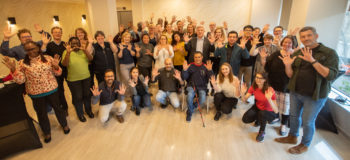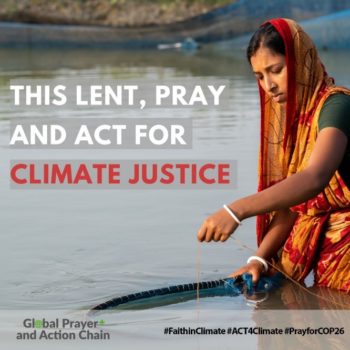Access to asylum cannot be denied: ACT Alliance appeals to the EU, its member states and the Turkish government for humanity and solidarity
STATEMENT
The current situation at the Greek-Turkish border is a testament to the failure of the international community at large to address the root causes of violent conflict, including the ongoing hostilities in Syria, as well as the failure to address its humanitarian and human rights fallout across borders, in particular on the part of the EU, Turkey and Greece.
Crossing borders to seek asylum on land or sea is not a crime, nor illegal under international or EU law. Giving access to asylum is an obligation under international and EU law that needs to be respected, and for which there is no acceptable derogation.
Bearing the brunt of these failures are the affected refugees themselves, whose position has become ever more untenable. The conditions they are facing are dire and are calling for immediate assistance. Even before the crisis in Idlib escalated further and refugees arrived at their border, reception conditions in Greece, especially in the overcrowded hotspots on the islands, were already seriously undermining basic standards of human dignity. Tensions between the local population, refugees and civil society organizations have become a daily reality, and sea arrivals are being made impossible. Of particular concern are also the recent xenophobic mob attacks on those refugees who have managed to reach the islands, as well as on journalists and humanitarian workers assisting them or covering the situation.
ACT Alliance members have been working with partner organisations to meet the needs of refugees stranded in Turkey by providing baby blankets, hygiene sets and simple raincoats as well as portable toilets and water systems in areas where many refugees are staying in makeshift tents and a high number still remains without shelter. Member also highlight the specific protection needs of lactating women who cannot join the food distribution lines, and of babies and children who are facing hunger and are battling the cold weather. Widespread problems of exploitation at the hands of smugglers and extortions by profiteers for sales of bread and water are making the situation even more dramatic.
ACT Alliance members are also identifying and addressing an increase in relief needs in Greece, providing emergency relief kits, education for children and advice lines. They’re also working closely with UNHCR and UN agencies, journalists and politicians to coordinate the response efforts, but the current status quo is dramatic, to say the least.
These developments are an expected yet a tragic consequence of the ill-fated EU-Turkey deal from 2016, which paved the way for Fortress Europe externalizing refugee protection. It was clear then and can certainly no longer be denied today, that this deal inherently exposed the EU to the kind of blackmail we are witnessing today, along with the erosion of long-held standards of protection and dignity.
On the policy front the Greek government must immediately revoke its decision to close the borders and stop taking asylum claims. The institutions and fellow member states of the European Union must also call upon Greece to respect its obligations instead of supporting their violent behaviour at the border.
Internal EU solidarity should mean immediate relocation of refugees from hotspots and reception centres and assistance in the reception of and quick relocation of newly arriving asylum seekers, hoping it will motivate Greece to return to lawful practice. At the local and municipal level, a coalition of mayors has already offered their support, for instance in Germany – countering the populist myth that “the people” of Europe are demanding tougher migration and asylum policies and thus forcing policymakers’ hands, and showcasing the solidarity and support Europeans and European civil society have been showing in the welcoming and reception of newly arriving third country nationals.
It is against basic human dignity to use human suffering for political gain. The circumstances for persons in need of international protection in Turkey are very difficult, especially for those who are non-Syrian with no access to proper refugee status determination or protection in Turkey. Therefore, and because Turkey remains the country hosting the largest number of refugees worldwide, criticism of its tactics must be linked with reinforced offers of support for durable solutions, which at this stage means resettlement from Turkey, as well as financial assistance to help the country`s asylum and integration system.
While it is unacceptable to promote “safe zones” or to enable the premature return of refugees to Syria, the most recent response by the Greek government endangers the rights of persons on the move, including potential violations of the non-refoulement principle, and/or the triggering of chain refoulement. All EU agencies including the European Border and Coast Guard Agency (Frontex) are bound by the EU Charter on Fundamental Rights and cannot participate in operations violating fundamental rights.
In order to address this pressing humanitarian crisis, we call on the Greek and Turkish governments to provide full and unconditional access to deliver humanitarian assistance to those stranded at the border. The number and condition of these people in need remains largely unknown, which is a cause for grave worry.
In addition, in the rest of the country, as of 6th March, 115,000 migrants and refugees remain stranded in Greece, of whom around 41,200 are on the islands of Lesvos, Samos, Chios, Leros and Kos. More than 41,000 people remain stranded in reception centres across these islands which were originally designed for 5,400 people. Thousands of women, men, and children living in small tents are exposed to cold and rain with little or no access to heating and electricity. Hygiene and sanitation conditions are unsafe, and health problems are on the rise. Many cannot see a doctor as there are simply too few medical staff at the reception centres and local hospitals (IFRC, 5 March 2020).
Despite ongoing assistance, operations still do not meet the needs of refugees. Funding is required to support efforts in Turkey and Greece.
Any measures taken by actors involved must comply with international human rights law.










 “The ACT Alliance has been, and continues to be an expression of the ecumenical commitment of the LWF and other members of the Alliance to work together with others in the ecumenical movement, to engage in the diaconal ministry of our churches and to serve those most in need,” said Maria Immonen, Director of World Service for the Lutheran World Federation and member of the ACT Governing Board. “LWF remains committed to this vision – that of an Alliance and an ecumenical movement which is not occupied with itself, but with the people in the world that it was created to serve. The fact that the world is changing at a higher speed than ever before, and the challenges are growing bigger every day, makes it even more important that we don’t lose sight of the reason why we created the ACT Alliance.”
“The ACT Alliance has been, and continues to be an expression of the ecumenical commitment of the LWF and other members of the Alliance to work together with others in the ecumenical movement, to engage in the diaconal ministry of our churches and to serve those most in need,” said Maria Immonen, Director of World Service for the Lutheran World Federation and member of the ACT Governing Board. “LWF remains committed to this vision – that of an Alliance and an ecumenical movement which is not occupied with itself, but with the people in the world that it was created to serve. The fact that the world is changing at a higher speed than ever before, and the challenges are growing bigger every day, makes it even more important that we don’t lose sight of the reason why we created the ACT Alliance.” Together, we have responded to humanitarian disasters ranging from the Haiti earthquake, to the protracted crisis in Syria, to drought in the horn of Africa. We have engaged in capacity building, development and advocacy towards a world where all of God’s creation lives with dignity, justice, peace and full respect for human rights and the environment.
Together, we have responded to humanitarian disasters ranging from the Haiti earthquake, to the protracted crisis in Syria, to drought in the horn of Africa. We have engaged in capacity building, development and advocacy towards a world where all of God’s creation lives with dignity, justice, peace and full respect for human rights and the environment.
 Faith based organisations including the
Faith based organisations including the